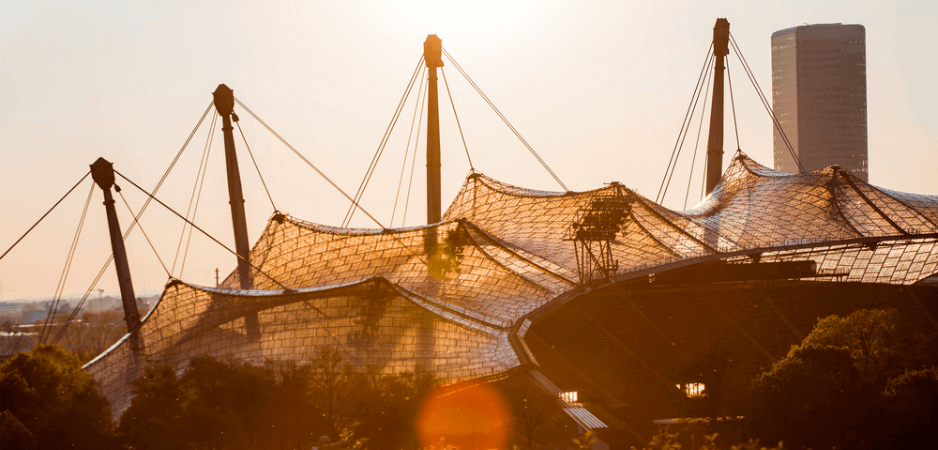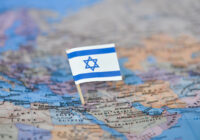International sporting events, especially the Olympic Games, are a perfect theater in which to play out political dramas.
“The world will begin hearing us. We are, for 24 years, the world’s largest refugee population. Our homes taken from us, living in camps, no future, no food, nothing decent for our children.” Mahmoud Hamshari, the leader of the Palestine Liberation Organization (PLO), speaks in measured terms in Steven Spielberg’s 2005 film Munich. Hamshari is reacting to the events of September 5, 1972, when members of the PLO splinter group Black September (named after a conflict fought in Jordan between the Jordanian armed forces and the PLO) invaded the Olympic Village in Munich, targeting the Israeli team.
At 4:30 am, eight men wearing tracksuits climbed the fence surrounding the Olympic Village. They were seen, but no one suspected anything was unusual: Athletes routinely jumped over the fence; the weapons were hidden in regular sports bags. Just before 5:00 am, the intruders knocked on the door of Israeli wrestling coach Moshe Weinberg. When Weinberg opened the door, he immediately shouted to his teammates for help. He and weightlifter Joseph Romano attempted to block the door while other Israelis escaped, but the two men were killed. The invaders then took nine Israelis hostage.
The Olympic Games were already in progress and, despite demands that they be aborted, the International Olympic Committee (IOC) insisted they continue. Black September demanded the release of hundreds of Palestinian prisoners from Israeli prisons and a safe passage out of Germany — and nothing less. There was no room for negotiation.
Free of Politics
In the 1970s, security at global sports events was perfunctory. Even so, Munich was relaxed and almost complaisant — there was enough speculation in the air to suggest something unexpected could happen. Four years before at the Mexico Olympics, two African American athletes used the victory rostrum to make a gesture that is still resonant today: In raising black-gloved fists and bowing their heads as the “Star-Spangled Banner” played, Tommie Smith and John Carlos created a narrative bigger than any Olympic Games in history. There was no violence, but the black power salute, as it became known, should have alerted Olympic organizers to the potential for another social or political gesture.
Hamshari’s pitiless verdict suggests he saw the value of the atrocity in the context of the world’s premier global sporting event. Since 1948, when the state of Israel had been established in what was previously British-mandate Palestine, the political rights of displaced Palestinian Arabs have been disregarded. After Munich, the world would take notice, he speculated. In a sense he was right: Despite the condemnation and the vilification of Black September, the event itself magnified the Palestinian cause.
Surprisingly, there was just a single day’s mourning following the siege. Then competition resumed. Avery Brundage, at the time president of the IOC, famously announced that “We cannot allow a handful of terrorists to destroy this nucleus of international cooperation and goodwill we have in the Olympic movement.” Brundage is featured making this declaration in Kevin MacDonald’s 1999 documentary One Day in September. “The games must go on,” he concludes.
It wasn’t the first time a political pulse had throbbed at the Olympics. In 1956, Brundage, then the IOC’s vice president, observed: “Sport is completely free of politics.” It was a view colored by idealism, optimism or possibly just ignorance. Brundage was responding to the withdrawal of six Olympic member countries from the Melbourne games in protest at the Suez Crisis and the Soviet suppression of the Hungarian Uprising. In fact, since 1956, every summer Olympics have been implicated in some sort of political controversy.
The most common form of political gesture has been the boycott. Countries absenting themselves from competition either as a sign of protest, or because of exclusion, have been a feature of Olympic history and, indeed, of much the narrative of modern sport. In 1980, the Moscow Olympics were boycotted by several countries protesting against the Soviet invasion of Afghanistan. A lesser known Olympic boycott four years before involved the withdrawal of African nations that objected to the International Olympic Committee’s refusal to bar New Zealand from the Montreal games. New Zealand had maintained sporting links with then-ostracized South Africa.
Boycotts usually make headlines and attract the rhetoric of interested parties who talk regretfully about how unfortunate is it that sport and politics have become mixed up. In fact, sport and politics are entwined so closely that they will never be separated — sport is an effective vehicle for promoting or publicizing causes, principles and aims, as well as full-blown ideologies.
The setting and imagery of the Olympics and other international events have been used to sensationalize events seemingly unconnected with sport. So many of the themes inherent in sport have political and ideological potential: nationalism, competition, the pursuit of supremacy, the heroism of victory — all have a wider application. Differences between the contrived competition of the track and field events and the real conflict in the streets have often melted in the spectacle.
Effective Tactics
Presumably, this was on the minds of Black September when it planned what turned into a bloodbath. The group’s demands for the release of more than 200 Palestinian prisoners were not met, precipitating a sequence of killing. The nine hostages were executed at the airport; a German policeman was killed in the botched rescue attempt, along with five of the terrorists. The remaining three were part of a hostage exchange following the Palestinian hijacking of a Lufthansa flight, the Mossad’s hunt for the surviving terrorists being the foundation for Spielberg’s Munich.
“The Munich attack was so notorious its implication reached far beyond the area of sport, to the extent that it has been described as the defining moment in the growth of modern terrorism,” writes the Australian scholar Kristine Toohey, underlining the event’s historical importance. “The global attention it received demonstrated that terrorism could be an effective tactic in challenging governments and raising international awareness of a political cause.” It was a bone-chilling evaluation and one that has gained credence in the years that have passed since Munich.
In 1996 in Atlanta, Georgia, a pipe bomb was detonated by a white supremacist. In 2009, a bus carrying the Sri Lankan national cricket team to play Pakistan was attacked by a dozen gunmen believed to be affiliated to Lashkar-e-Jhangvi, a Sunni militant group. Six members of the team were injured; six members of the Pakistani police escorting the bus and two civilians were killed.
The 2013 Boston Marathon was disrupted by explosions that killed three people and injured dozens more. Two Chechens were responsible: One was killed, the other is on death row. The surviving teenage brother denied affiliations to any particular group or movement, but said he had been inspired by Islamist beliefs and the wars in Iraq and Afghanistan.
Three years ago in 2015, Paris’s Stade de France was the focus of three suicide deaths that became a prelude to a night of violence culminating in the slaughter of 130 at the Bataclan nightclub. The so-called Islamic State later claimed responsibility for the attacks.
International sporting events, especially the Olympic Games, have the kind of generic relevance that makes them a perfect theater in which to play out political dramas. Ostensibly theatrical competitive occasions, sport has continually managed grandly to capture tensions, protests and sometimes atrocities that encircle the world. By celebrating the alleged unity, at least in spirit, of the world’s population, sport has sought temporarily to suspend terrorism, racism, imperialism, ideological differences and other “worldly” matters that are the bane of our age. Instead, it has been hijacked by them.
The views expressed in this article are the author’s own and do not necessarily reflect Fair Observer’s editorial policy.
Support Fair Observer
We rely on your support for our independence, diversity and quality.
For more than 10 years, Fair Observer has been free, fair and independent. No billionaire owns us, no advertisers control us. We are a reader-supported nonprofit. Unlike many other publications, we keep our content free for readers regardless of where they live or whether they can afford to pay. We have no paywalls and no ads.
In the post-truth era of fake news, echo chambers and filter bubbles, we publish a plurality of perspectives from around the world. Anyone can publish with us, but everyone goes through a rigorous editorial process. So, you get fact-checked, well-reasoned content instead of noise.
We publish 2,500+ voices from 90+ countries. We also conduct education and training programs
on subjects ranging from digital media and journalism to writing and critical thinking. This
doesn’t come cheap. Servers, editors, trainers and web developers cost
money.
Please consider supporting us on a regular basis as a recurring donor or a
sustaining member.
Will you support FO’s journalism?
We rely on your support for our independence, diversity and quality.







